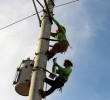Casiño filed House Bill 5405 or the One Million Solar Roofs Act of 2011 in October last year, saying it’s the State’s responsibility to “promote the utilization of renewable energy resources to reduce dependence on imported energy from fossil fuels.” The bill also takes into account public health and the environment.
By ALEX D. LOPEZ
Davao Today
DAVAO CITY, Philippines — A progressive lawmaker is supporting the call for a massive installation of solar panels in Philippine cities and provinces to provide solution to the country’s energy sector.
Teddy Casiño, Makabayan Coalition’s sole bet for Senator, is one with the proposal of a group of solar technology developers, the Philippine Solar Power Alliance (PSPA), to put up solar panels in the rooftop of houses, buildings and commercial establishments.
“I strongly support such initiatives,” Casiño told davaotoday.com, adding that the One Million Solar Roofs Bill in Congress is, in fact, one of his proposed measures.
Casiño filed House Bill 5405 or the One Million Solar Roofs Act of 2011 in October last year, citing that it is the State’s responsibility to “promote the utilization of renewable energy resources to reduce dependence on imported energy from fossil fuels.” The bill also takes into account public health and the environment.
In its proposal, PSPA said residential projects being constructed each year count to almost half a million. It added that installation of solar panels to about 10 percent out of these residential units would be of big help to power generation companies.
“The proposal will also trim down the country’s reliance on imported fossil fuels,” said Theresa Cruz-Capellan, PSPA president.
Just recently, the Philippine Chamber of Commerce and industry issued a statement on the inevitable power outages that the Mindanao Island will experience in the next three years due to exceeding demand against the existing power supplies.
“Solar technology is sustainable,” Casiño said, adding that “it can be the immediate way to deal with the country’s energy problems, especially with the abundance of solar energy throughout the country and the modular nature of solar energy systems.”
Solar panel is composed of connected assembly of photovoltaic cells. It is also called solar module, photovoltaic module or photovoltaic panel. In order for it to be applied for residential or commercial purposes, a larger photovoltaic system is needed to generate and supply electricity. It uses light energy called photons from the sun to generate electricity through photovoltaic effect.
Casiño’s proposed bill also encourages the use of small solar power systems in residences and offices where the solar power technology’s portability and flexibility can be maximized. It also provides incentives and financing facilities to common electricity consumers, including small to medium establishments, who want to put up their own solar power systems.
Homeowners and entrepreneurs can apply for loans from the Pag-Ibig, Government Service Insurance System, Social Security System, among others for the procurement of solar panels and pay the loaned amount from the savings they incur in their electricity bills.
The government should invest in solar power, he said, to “promote energy stability and independence from imported energy sources, mitigate global warming and air pollution and encourage industry growth that will lead to more jobs and lower electricity bills.” (Alex D. Lopez/davaotoday.com)










